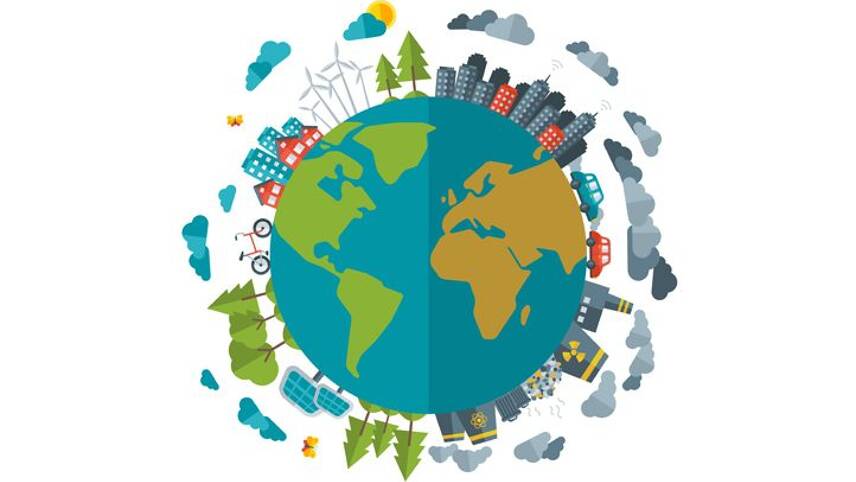Register for free and continue reading
Join our growing army of changemakers and get unlimited access to our premium content

‘Earth Overshoot Day’, which passed on Monday, is not something to be celebrated. It serves as a depressing reminder of just how far the world’s developed nations still have to come to stop overfishing, overharvesting, overforesting and emitting more carbon dioxide into the atmosphere than the forests can sequester.
If there was an Olympic Games of global resource overconsumption, the gold medal would go to Australia, which is currently using up as much resources as would be required by 5.4 Earths. The USA would take silver (4.8 Earths) and bronze would, somewhat surprisingly, go to Switzerland (3.3 Earths). The UK would rank eighth – three places higher than where we currently stand in the actual Olympics.
How many Earths do we need if… #earthovershootday pic.twitter.com/6j2f2PTzkI
— Somesh Sharma (@smashunits) August 9, 2016
But there are some signs of hope. And the 2016 Olympics in Rio represents one of them: awareness.
The Olympics itself is not exactly the “Green Games for a Blue Planet” that it claimed it would be in the bidding process. Venues have been contaminated with waste; waters are infected with superbugs, and the host city’s air quality remains at deadly levels. In one bizarre instance, the normally azure pool water within the Maria Lenk Aquatics Centre turned a swampy green for diving events – the organiser’s still aren’t quite sure as to the cause of what is being described on social media as #PoolGate.
Ermmm…what happened?! pic.twitter.com/pdta7EpP2k
— Tom Daley (@TomDaley1994) August 9, 2016
But event sustainability aside, the Olympics have – as edie’s top story this week concluded – provided a less-tangible but immensely-important benefit for the global climate movement. Climate change was front and centre of the Opening Ceremony on Friday night, with an estimated three billion people worldwide tuning in for an introductory video lesson about sea level rise and global warming.
Even the athletes are recognising the role they can play in raising awareness.
Global internet search and social media interest for these topics duly rocketed during and shortly after the Ceremony – as they did for Earth Overshoot Day earlier this week, for the Paris climate talks in December, and for Leonardo Dicaprio’s climate change-focussed Oscar’s acceptance speech in February (Tweets including the phrases “global warming” or “climate change” increased by 636% after that single speech).
What does all of this tell us? Well, consumers – otherwise known as ‘people’ – are, at the very least, interested in global climate issues and, as we’ve seen by various climate marches around the world in recent years, many are now demanding action.
… And many businesses are taking on the baton. A quick look at edie’s news list reveals the extent to which some firms are now going to drive low-carbon, resource-efficient business: ING has raised €27bn to fund green business growth; UPS passed the one-billion-mile milestone for its ‘Rolling Laboratory’ green fleet; Virgin Media recorded its “biggest ever” year-on-year carbon reduction; Johnson & Johnson launch a new set of highly-ambitious sustainability targets for 2020; Newcastle United kicked off the Championship football season with a new CHP system; Ford’s Dagenham facilities unveiled plans to halve energy and water consumption; and O2 has managed to recycle more than two million old mobile phones through its Think Big CSR programme.
All of the above business-led initiatives were covered in the past week on edie. The green industrial revolution is happening all around us. The question is: what if you don’t join the charge?
First, you risk getting left behind. As Unilever’s senior vice-president of global marketing Aline Santos told us this week, businesses that fail to collaborate and innovate will lose out. “This is the most critical time for innovation and its absolutely the time for innovation to start providing solutions,” Santos said. “Not innovating and not taking risks is arguably the biggest risk of all, and its why we have to start harnessing as much as we can from others.”
And second, you risk a complete meltdown of operations. A report released today by WWF reiterates this, from a timber supply chain perspective. Retailers that fail to become more resilient against this timber supply risk could be left exposed with few commercial options in the future, because countries that supply timber to the UK – such as Brazil, Vietnam and Thailand – are either reaching the point of expiry or running at a deficit as forest resources are used up without adequate provision for sustainable timber supply.
Which brings us back around, in true circular-economy fashion, to Earth Overshoot Day. That this planet is rapidly running out of resources is an inalienable truth. And it’s equally true that the various organisations we all work in will still want to be around and operating profitably in five, 10 or 20 years’ time. But unless we can truly decouple ‘profitability’ and ‘sustainability’, then we will quickly surpass the crucial 1.5 and two-degree limits of global warming – which is a record that no Olympian would be proud to see us break.




Please login or Register to leave a comment.